On 25th September, 193 countries unanimously adopted a new development agenda, which include 17 goals for sustainable development. To achieve them, it will take not just actions from governments, but from businesses, civil society and ordinary citizens. In this portrait series, we wanted to highlight how remarkable individuals are already making a difference towards achieving these goals, showing that no action is too small. We hope that their stories inspire you to take action as well in your own capacity towards a better future for all people and planet.

“The bicycle changed my life. I can now carry up to 120 kilograms. My income has risen by at least three-fold.”
Khagisara, Nepal
Khagisara started to grow and sell vegetables to provide for her family after her husband passed away, but with a bad leg, it was difficult for her to carry around her vegetables. Two years ago, she received a bicycle and crates to carry vegetables, as well as entrepreneurship training from the government of Nepal and the UN Development Programme. Since then, things started to change for the better.
Goal #1 aims to end poverty in all its forms everywhere. By 2030, we will ensure that all men and women, especially the poor and the vulnerable, have equal rights to economic resources.

“After each meal I feel stronger.”
Korka, second grader, Mali
Korka is the first one in her family to attend school. For her, going to school has become a passion. She is enthusiastic and remembers her lessons quickly. She wants to become a nurse in the future. But before the World Food Programme’s school meal program, Korka’s family simply couldn’t afford her education. “Now that Korka eats every day at school, I can worry less. Without the meals, it would be hard for us to have her stay at school,” says Korka’s grandmother.
Goal #2 aims to end hunger and all kinds of malnutrition. By 2030, we will ensure zero hunger on the planet, so no children will be deprived of the opportunity to grow healthy and stay in school.
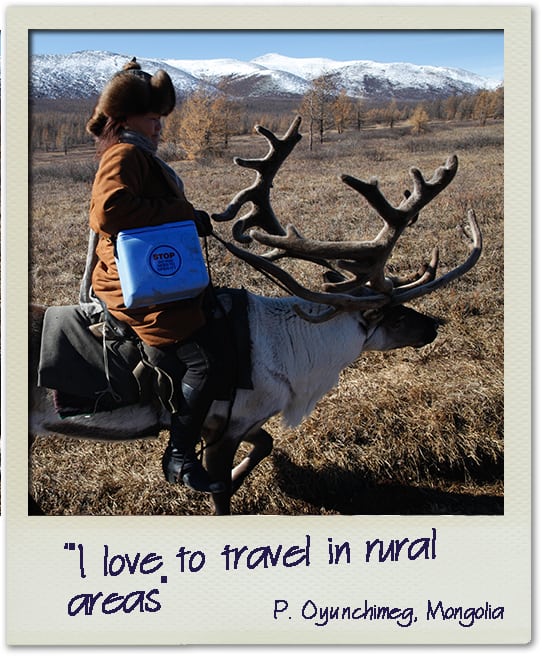
“I love to travel in rural areas. It’s both rewarding and fun to help people here. I worked as a surgical nurse for 18 years and as a ‘bagh feldsher’ (a government health worker who provides essential services for nomadic herder communities) for 10 years before becoming a vaccinator.”
P. Oyunchimeg, measles and rubella vaccinator, Mongolia
Every year, P. Oyunchimeg and her team of vaccinators undergo a lengthy journey that involves traveling by car, hand-drawn ferry, reindeer and foot to vaccinate children from remote nomadic herder communities.
Goal #3 aims to ensure healthy lives and promote well-being for all at all ages. By 2030, we will achieve universal access to essential healthcare services and access to essential medicine and vaccines for all.
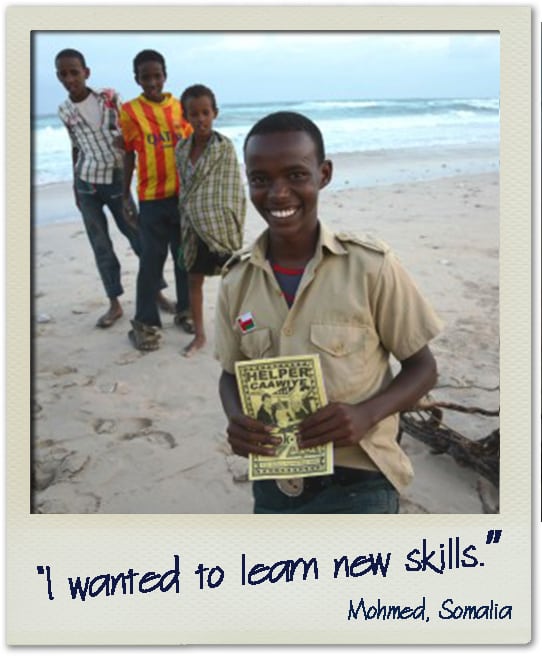
“Before the programme, I was doing nothing – this is a small village. I wanted to learn new skills.”
Mohmed, Somalia
Like many young men in his village, Mohmed didn’t have many plans for his future. A lack of education and opportunities led many young Somalis into conflict and piracy. However, after taking vocational training at the UN Development Programme’s Alternative Livelihood to Piracy program, Mohmed is now excited to take on a different journey in his life.
Goal #4 aims to ensure inclusive and equitable quality education for all. By 2030, we will make sure that all girls and boys can complete primary and secondary education, and ensure equal access to quality vocational and tertiary education.

“People were saying that I would die as a witch as no one would marry an uncircumcised girl.”
“We are the pioneers in our locality, and many young people have followed us. In the past, no one wanted to touch an uncircumcised girl; now, young men are fighting over these girls.”
(Hawa & her husband, Enehaba, Ethiopia)
24 year-old Hawa was among the first in her conservative community to defy the tradition of female genital mutilation and arranged marriage. Today, being a mother of two, Hawa has managed to stay in school and dreams of going on to college.
Goal #5 aims to achieve gender equality. In the next 15 years, we will work to empower all women and girls everywhere.

“When I entered the Parliament of Cabo Verde in 2011, many people told me that my life would change for the worse. They told me that being a woman, and on top of that, being very young would not work for a parliamentarian. But I decided to continue. And now I can see that being a young woman is an opportunity and not an obstacle. Now I am very much respected for the work I do.”
Graça, President of the Network of Women Parliamentarians, Cabo Verde
At the age of 30, Graça became one of the youngest Members of Parliament in her country. She was singled out by UN Women as a ‘Woman of Achievement.’ You can read a full interview with her here.
Goal #5 aims to achieve gender equality and empower all women and girls. By 2030, we are going to ensure women’s full and effective participation for leadership at all levels of decision-making in political, economic and public life.
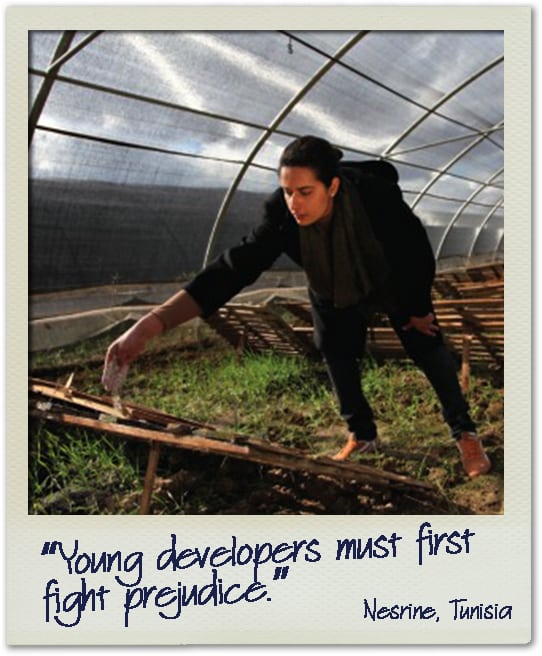
“At the start, no one believed it. I really had to fight to convince my loved ones that I had the necessary skills and desire to move forward. Young developers must first fight prejudice.”
Nesrine, snail farming entrepreneur, Tunisia
In recent years, jobs have been scarce in Tunisia. In 2011, Nesrine joined the UN Development Programme’s “Employment Generation for Youth in Tunisia” project and since then she has started to receive trainings on business skills, and finally started her own eco-friendly snail farm. Lately, she has been working on expanding her business overseas with like-minded young people.
Goal #8 aims to promote sustainable economic growth and decent work for all. By 2030, we will achieve full and productive employment, including for young people and persons with disabilities.

“I have survived several cyclones, but the memory of losing my family in a cyclone stays with me.”
Monu, Bangladesh
In Monu’s village, fishermen used to depend on traditional prediction methods for cyclones or bad weather before going to sea, but that didn’t always work out. To reduce loss from extreme weather events, the government of Bangladesh and the UN Development Programme collaborated on a disaster prediction project that provides accurate information through community radio and mobile phone technologies, to help people make the right decisions.
Goal #9 aims to build resilient infrastructure. By 2030, we will develop quality, sustainable and resilient infrastructure to support economic development and human well-being.
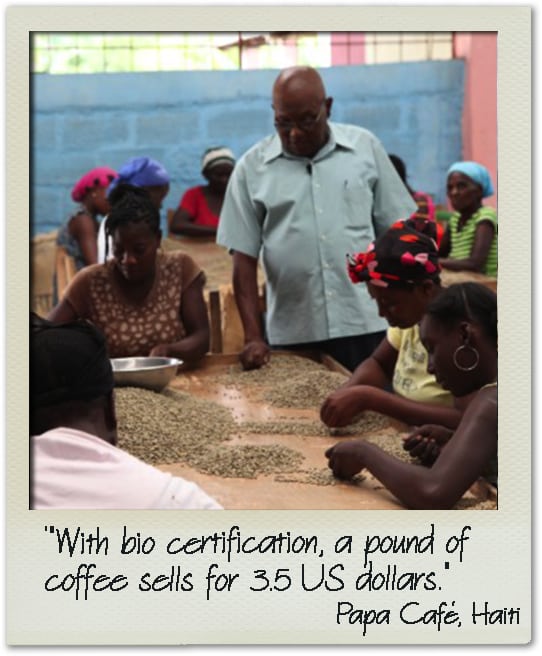
“With bio certification, a pound of coffee sells for $3.5 US dollars. Before, our pound of coffee was selling for less than $2 US dollars. With this added value, the producers understand that they have to be more rigorous and professional in cultivating their coffee.”
Francisque Dubois, aka “Papa Café”, Haiti
Francisque is the co-founder of coffee cooperative COOPACVOD. Supported by the UN Development Programme, Papa Café now has 680 members and produces an organic coffee sold in Europe and North America.
Goal #12 aims to ensure sustainable consumption and production patterns. By 2030, we will achieve the sustainable management and efficient use of natural resources.
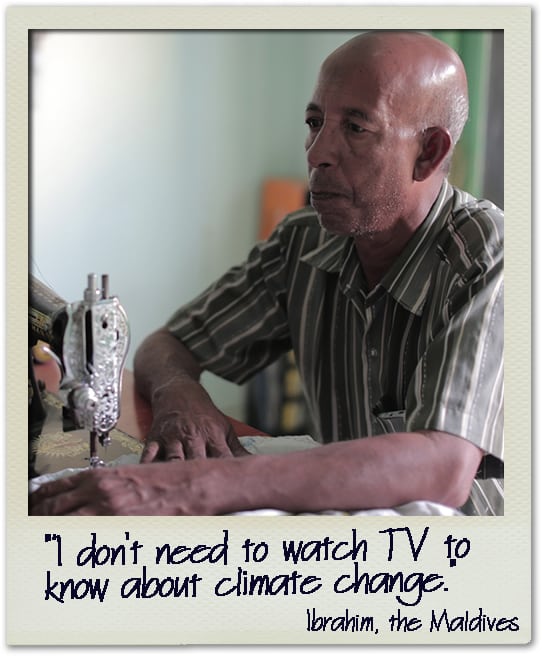
“I don’t need to watch TV to know about climate change, I’ve seen it happen through my own eyes: coastal erosions are becoming faster and saltwater is intruding in our freshwater.”
Ibrahim, tailor & restaurant owner, the Maldives
For most of us, the Maldives is the ultimate tropical resort, but for the people living on the islands, it’s their home, which is now under the threat of rising sea levels, salination of underground water, and extreme weather events. The government of the Maldives and the UN Development Programme are working together to help Maldivians adapt to climate change, but it takes global actions to tackle the root cause of it.
Goal #13 aims to take urgent action to combat climate change and its impacts. It calls for the international community to strengthen resilience to climate-related hazards and integrate climate change measures into national policies.

“In 1989, I realized that the keys to oyster farming are the rivers and the forests upstream. I organized fishermen to start caring for the forests. We call it ‘the forest is longing for the sea, the sea is longing for the forest’. As a result, the condition of the ocean has gradually improved.”
Shigeatsu, UN Forest Hero, Japan
Known as the “Grandpa Oyster” by the locals, Shigeatsu has spent more than 20 years developing the forest environment that keeps the Okawa River clean and his oysters healthy. His efforts encouraged water drainage regulation reform and promoted organic farming practices.
Goal #15 aims to protect, restore and promote sustainable use of terrestrial ecosystems. By the end of 2020, we will ensure the conservation, restoration and sustainable use of terrestrial and inland freshwater ecosystems.
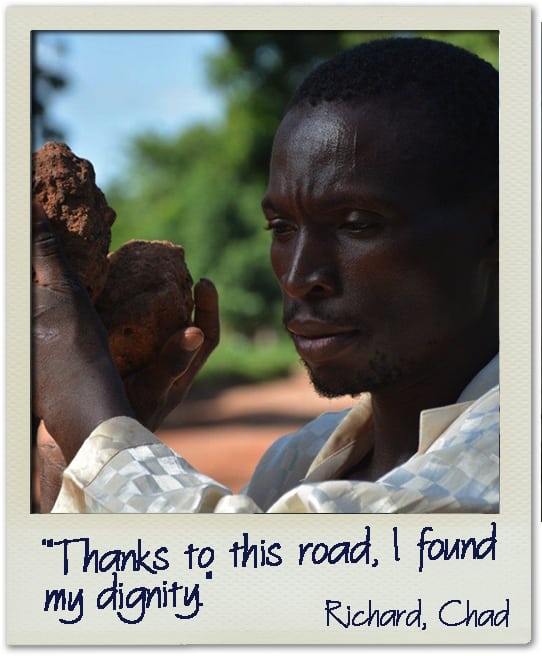
“Thanks to this road, I found my dignity.”
Richard, returnee from Central African Republic , Chad
Richard is one of the 113,000 Chadians who returned to Chad from Central African Republic after conflict broke out in 2013. As a returnee to his home country after decades, he no longer has a support network to lean on. To provide support to the returnees and the villagers from the host communities, the World Food Programme started offering vouchers to participants in asset-building projects. Along with 1,000 people, Richard built a 7km road in only three months. In return, he received vouchers to buy food locally.
Goal #16 aims to promote peaceful and inclusive societies for sustainable development. By 2030, we will help people like Richard who are affected by conflicts find refuge and get back on their feet again.
